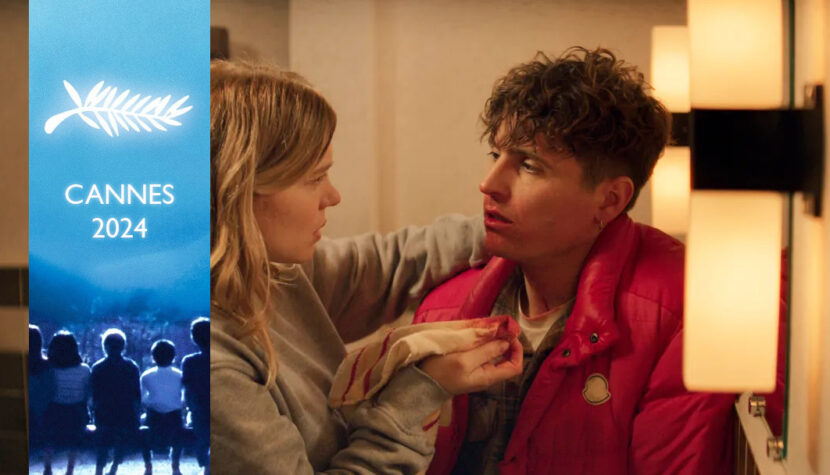THE SECOND ACT. For real, in jest, playfully

Small talk. Preparation for the role, the actual part of the plot, or a stroll of two actors on a film set. David (Louis Garrel) and Willy (Raphaël Quenard) talk about everything and nothing. The unbearable Florence (Léa Seydoux) has latched onto the first one. Phone calls every half an hour, exhausting chatter, already planning the wedding. For David, it’s too much, too fast, an absurd situation that’s very difficult to untangle from. Therefore, he needs Willy to unload this emotional burden onto him. “Florence is very attractive, but she’s not the girl for me. Let her fall in love with you.” Willy reluctantly agrees, but surely there must be a catch. There won’t be just one, there will be a whole swarm of them. The entire *The Second Act* by Quentin Dupieux is indeed brimming with them.
It’s almost a film miniature (80 minutes), but *The Second Act* is dense with themes, trivial jokes cut through with heavy tragedy, narrative and scriptwriting tricks, reflections on the current state of the medium and what its future might be. Already in the opening long conversation between David and Willy, everything seems to go according to plan, but just one unfortunate, politically incorrect term is enough for one to warn the other to watch his language because “we are being recorded after all.” Breaking the fourth wall, a glance at the camera with a sense of embarrassment. Now they must explain and straighten out the awkwardness. The script (film within a film) text changes and falls into the first digression, the actors step out of one role and into another. Maybe it’s also a trap set for the audience. Unmasking doesn’t bring us closer to the truth, but rather triggers more confusion. Dupieux knows how to hold the viewer’s attention, because perhaps nothing works more effectively than the recurring doubt: “what are we dealing with here?”

The second film duo is Florence and her father/non-father Guillaume (Vincent Lindon). The girl wants to shine in a leading role while her screen partner, much more experienced, to say the least, couldn’t care less. Just one line is enough for him to announce, frustrated, that it makes no sense, that the whole acting profession is nonsense, that he’s had enough. How much can an unexpected phone call from a manager change, saying that Paul Thomas Anderson sees him in his new film. When all four – Willy, David, Florence, and Guillaume – sit together at a roadside café, no one might already know what is true, what is fiction, what is an aside, what is the main plot, whether it all has somewhere to go or if the essence of this project is to be stuck in one place.
*The Second Act* might thus be a constant rehearsal, an experiment probing the boundaries of the film text and how freely it can be treated. Quentin Dupieux jumps between all levels with great skill and ease, sometimes seamlessly connecting them, other times brutally bursting them from the inside. A lot of mushrooms in the soup and maybe even one too many. It’s hard to accuse this French director of a tendency to exaggeration and quirks, but the short subplot with artificial intelligence, treated very superficially and in passing, seems more like an idea for another film rather than something really needed in *The Second Act*.
However, it is not pure formalism and innocent meta-convention play. It’s due to the side plot of a certain extra (Manuel Guillot), overwhelmed by the role of a waiter and unable to handle pouring wine into four glasses. In his plot, Dupieux also layers the narrative: tragedy will turn into mocking laughter, one punchline may turn out to be another twist, with the next one perhaps not being so funny anymore. If it’s just a ruse and a dramaturgical ploy, it ultimately touches on the truth in its peculiar way. Although every cinephile knows very well that there is never any on-screen truth.

